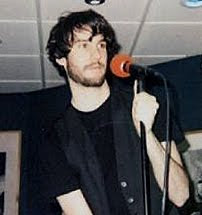I'm notorious for my dislike of The Doors. It's not that I think they as a band are awful, it's just that Jim Morrison is. He is by far one of the most overrated singer/lyricists of all time, and his behavior both on stage and off was appalling. I usually don't condemn rockstarish behavior as it really doesn't have anything to do with the music, but it bothers me in the case of Morrison because I don't feel he was a strong enough artist to warrant his erratic behavior. However, I digress...
One of The Doors' most famous songs is the dirge "The End," which closes out their debut album. Long and surreal, i's a decent entry in the progression of experimental music on pop records. But while the original gets lost in its jammy excesses, the cover performed by Nico on the June 1, 1971 album fares much better. Accompanied by Brian Eno on synthesizer, Nico plays a droning harmonium throughout the nine minutes of the performance. While The Doors version is drugged out and hazy, Nico's is focused and haunting, feeling like inevitable, impending danger.
Tuesday, November 23, 2010
Sunday, November 21, 2010
"Heresy" and where it came from
It should be no surprise that Trent Reznor is a Depeche Mode fan. His music has always evoked the gothic brooding that DM is most known for, not only in mood but in execution, using hard industrial synths and mechanical beats. While most industrial acts from the 80's like Nietzer Ebb and KMFDM appealed to a select audience, Depeche Mode had several industrial qualities while never getting burdened with the tag, (listen to "People Are People" to get what I mean).
While the closest Nine Inch Nails have ever come to being in the same fish tank as Depeche Mode is their debut, Pretty Hate Machine (1989), the song that bears most resemblance to the group is on the caustic "Heresy", found on Reznor's niche market solidification, The Downward Spiral (1994). On the CD issue of Depeche Mode's Music For The Masses (1987), there's a remix included as a bonus track - an "aggro" mix of the single, "Never Let Me Down Again". On it is a programmed synth pattern that more or less can be cited as the basis for the NIN song. Whether Reznor's borrowing was an intentional homage, or his collective unconscious at work, it makes for an interesting listen when examining the evolution of music trends.
While the closest Nine Inch Nails have ever come to being in the same fish tank as Depeche Mode is their debut, Pretty Hate Machine (1989), the song that bears most resemblance to the group is on the caustic "Heresy", found on Reznor's niche market solidification, The Downward Spiral (1994). On the CD issue of Depeche Mode's Music For The Masses (1987), there's a remix included as a bonus track - an "aggro" mix of the single, "Never Let Me Down Again". On it is a programmed synth pattern that more or less can be cited as the basis for the NIN song. Whether Reznor's borrowing was an intentional homage, or his collective unconscious at work, it makes for an interesting listen when examining the evolution of music trends.
Wednesday, November 17, 2010
The Move - "Feel Too Good"
Truly one of the most underrated rock epics of all time, The Move's "Feel Too Good" is a sledgehammer, soul/funk free for all. Coming in smoothly with confident drumwork, the bass thumps down with no regard for anything in sight. The guitars enter viciously while Roy Wood delivers one of his most enthusiastic lead vocals.
From the band's third full length album Looking On, released in the fall of 1970, "Feel Too Good" shows The Move changing at an alarming rate. Starting off as a psyche pop group with their self titled and a handful of singles, the band grew more muscular with Shazaam (1970). With the entrance of The Idle Race's Jeff Lynne, The Move began to take a backseat to Lynne and Wood's new project - Electric Light Orchestra. While contarctual obligations kept them linked to The Move for another two albums, they handled their disinterest incredibly well - cutting two solid records with Looking On and Message From The Country, as well as a few non album singles, like the amazing "Chinatown".
For "Feel Too Good", the band slams through a full nine minutes of hard hitting pyschedleic rock. Complete with bakup singers and swirling eastern tinged guiatr solos, the track is a non stop thrill ride with a curious, but always delightful barbershop quartet outro.
From the band's third full length album Looking On, released in the fall of 1970, "Feel Too Good" shows The Move changing at an alarming rate. Starting off as a psyche pop group with their self titled and a handful of singles, the band grew more muscular with Shazaam (1970). With the entrance of The Idle Race's Jeff Lynne, The Move began to take a backseat to Lynne and Wood's new project - Electric Light Orchestra. While contarctual obligations kept them linked to The Move for another two albums, they handled their disinterest incredibly well - cutting two solid records with Looking On and Message From The Country, as well as a few non album singles, like the amazing "Chinatown".
For "Feel Too Good", the band slams through a full nine minutes of hard hitting pyschedleic rock. Complete with bakup singers and swirling eastern tinged guiatr solos, the track is a non stop thrill ride with a curious, but always delightful barbershop quartet outro.
Back
Sorry to all that read this for the lack of posts. Been very busy latley. I'm hoping starting today, it will be updated with more regularity.
Subscribe to:
Posts (Atom)






